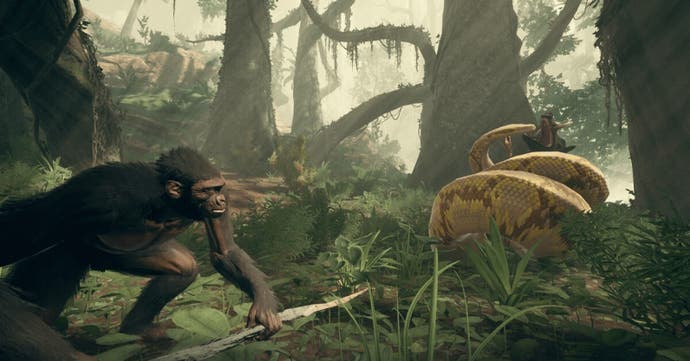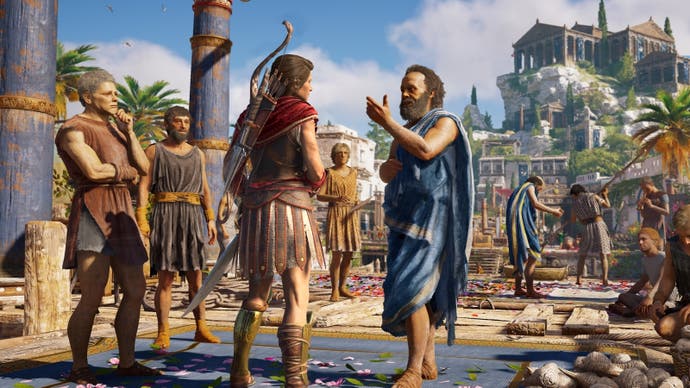Games can be our time machines
Talking about games, and talking through games.
During Eurogamer's 20th birthday celebrations, we talked a lot about gaming memories - games in relation to our personal histories, and games that shaped how game developers think about their own medium. One thing is clear - games are very dear to us on a personal level, and we can chart the rapid evolution and growth of the industry by looking at them. What's more interesting to me is whether at one point, looking back at games, we'll be able to chart changes to society or even humans as a species, the same way we do with all other media, basically.
As more and more people grow up with games, this seems inevitable - art imitates life, and both personal stories and broader topics inspire games. There's always a larger trend that shapes even our most personal stories. Take Path Out by Abdullah Karam and Bury Me, My Love by The Pixel Hunt. Both tell radically different stories set in motion by one event, the Syrian civil war. In a future where people hopefully don't remember what it was like then, these games could be important time capsules that help educate, just like they helped educate me as someone who only had an outsider's point of view on these events.
Humans are fascinated by their own history, and I think some games make a remarkable effort at depicting a world gone by. Assassin's Creed obviously needs to be mentioned here, even more so now that Ubisoft has made an effort to teach you more about the history of the series' locations via its virtual museum. I was also surprised how unflinchingly Mafia 3 and L.A. Noire reflected some widespread beliefs about how women and people of colour should be treated, and while some of this ideology has survived, such startling examples are a good way of showing how far we've come, how humans have bonded over time.

Ry Ga Gotoku Studio was even quicker in reacting to societal change - RGG famously removed a sidequest from Yakuza 3 in which a transgender person was referred to as "it", after its increasing international audience pointed out that attitudes have changed, to acknowledge this hurt many people's feelings. And Tomb Raider is a case that interests me when it comes to changing attitudes to games and gaming audiences over time. Eidos' original Lara Croft presented a possible blueprint of the ideal female video game character at the time: very good with firearms, sarcastic, fearless and sexy, exaggerated when it came to both her body proportions and character traits. It wasn't exactly a character for diverse audiences. The idea behind the rebooted Lara Croft is simple yet elegant - her look and way of dealing with the horrors she faces is more human, more identifiable for many people, while the exaggeration is now external, clear in her adventures and the lengths she has to go. The invincible hero with the eye-candy factor is a product of a different time where Tomb Raider is concerned, and yet that time was just over two decades ago.
When I was first thinking about this subject initially, my mind went to the more classic time-travelling stories, where a machine allows us to access something forever lost. Assassin's Creed in part works for me because the rush of recognition is so great. I remember looking at what I thought at the time was a perfectly rendered Santa Maria del Fiore and then scampering up to the top. It felt like interactivity couldn't get better than this. With the recent Notre-Dame fire however, I've been wondering if games could one day be one of our means to access a world gone by, together with simulated VR environments and AR overlays, things that seemed like decadently futuristic Blade Runner-esque stuff to me growing up. What if the version of Seattle in Infamous: Second Son of all things is the one that survives? Will it matter that it's just an artistic interpretation of the real place, built for the benefit of the player?

Ancestors: The Humankind Odyssey had the right idea of it, I think. From everything I've heard about it, it's a fairly tedious gaming experience, but if it's frustrating to play, it must have been fairly hellish to live - even though this is definitely not what developer Panache Digital Games was going for. It's perhaps similar to players complaining that the voices whispering to Senua in Hellblade put them off the experience, when everyone who has to live with something like it as part of a mental health condition tiredly raises their eyebrows in an approximation of "you think?" Both deliberately and accidentally, games mirror real experiences, and while not all of it is easy to translate into a gaming context, one way in which games now serve a use as time machines better than ever is that they can help us make sense of experiences through interactive means, both familiar and unfamiliar.
Of course there are games that actually try to educate players, preferably before it's too late, and create a snapshot of our current world. Abzû creates just the right atmosphere of wonder in its underwater world to just make you think that, gosh, all these animals and colourful reefs actually exist, and it teaches you the names of each species. Beyond Blue, an upcoming game by E-Line Media, goes one step further and as a collaboration with BBC's Blue Planet 2 seeks to incorporate documentary elements into a game of scientific underwater exploration.
I'm also very interested to see how organic learning about different animal species and their needs will be in Planet Zoo - with species dying on earth every single day at an alarming rate, some of the animals we take for granted could well go the way of the dodo, but personal attachment, even to a digital version of an animal, is a great way to raise awareness and maybe even spur people into action.
Games can reflect on the state of the world, but they're also a part of it - Fortnite is a central part of the discussion about how children spend their time, how parents need to stay digitally savvy in order to set boundaries and even how kids come into contact with other aspects of culture, say the Carlton Dance or musicians giving in-game concerts. We'll be talking about games a lot, but I think it will become increasingly natural to talk through games, and it will be exciting to see the possibilities (and limits) of games-as-historians - given that we can work out the industry's preservation issues.

